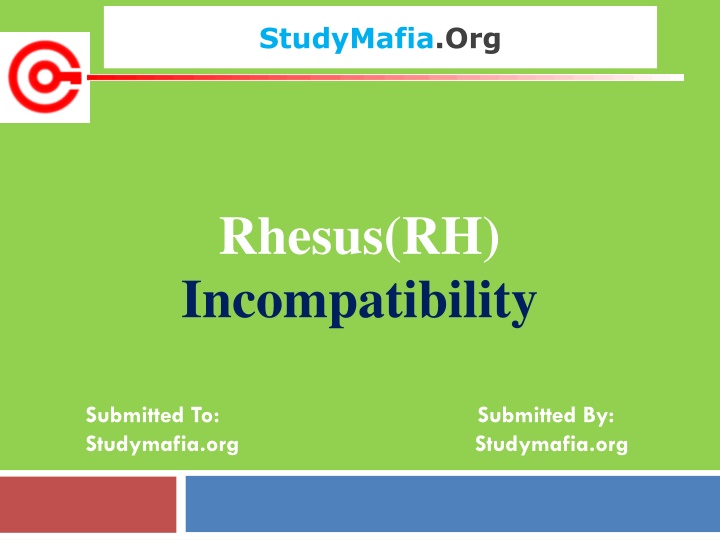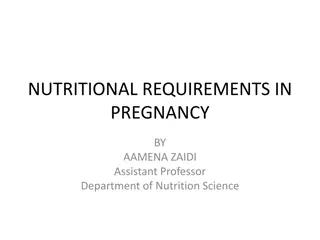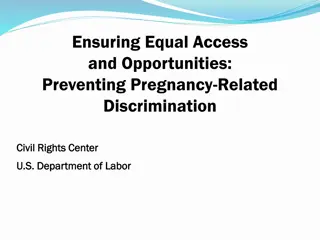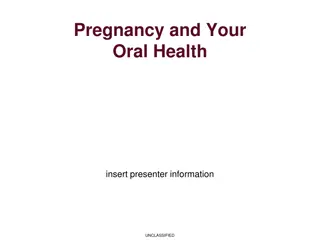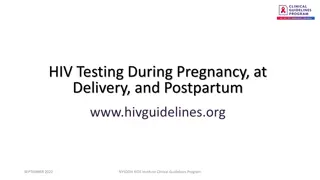Rh Incompatibility in Pregnancy
Rh incompatibility occurs when a mother is Rh-negative and her baby is Rh-positive, leading to potential complications during pregnancy. Learn about the causes, symptoms, diagnosis, treatment, and prevention strategies associated with Rh factor incompatibility.
Download Presentation

Please find below an Image/Link to download the presentation.
The content on the website is provided AS IS for your information and personal use only. It may not be sold, licensed, or shared on other websites without obtaining consent from the author.If you encounter any issues during the download, it is possible that the publisher has removed the file from their server.
You are allowed to download the files provided on this website for personal or commercial use, subject to the condition that they are used lawfully. All files are the property of their respective owners.
The content on the website is provided AS IS for your information and personal use only. It may not be sold, licensed, or shared on other websites without obtaining consent from the author.
E N D
Presentation Transcript
StudyMafia.Org Rhesus(RH) Incompatibility Submitted To: Studymafia.org Studymafia.org Submitted By:
Table Contents Introduction Symptoms of rh incompatibility How does Rh factor affect pregnancy? Causes of rh incompatibility Risk-Factors of rh incompatibility Diagnosis of rh incompatibility How is Rh incompatibility treated? Complications of rh incompatibility Prevention of rh incompatibility Conclusion 2
Introduction When a woman and her unborn baby carry different Rhesus (Rh) protein factors, their condition is called Rh incompatibility. It occurs when a woman is Rh-negative and her baby is Rh- positive. The Rh factor is a specific protein found on the surface of your red blood cells. Like your blood type, you inherit your Rh factor type from your parents. Most people are Rh- positive, but a small percentage of people are Rh- negative. This means they lack the Rh protein. 3
How does Rh factor affect pregnancy? A positive or negative symbol after your blood type indicates your Rh factor. For example, blood type: AB+ might be written on your medical record. Your Rh factor doesn t directly affect your health. However, Rh factor becomes important during pregnancy. If a woman is Rh-negative and her baby is Rh- positive, then the woman s body will approach the Rh-positive protein as a foreign object, if her immune system is exposed to it. 5
Causes of rh incompatibility This means that if blood cells from your baby cross your bloodstream, which can happen during pregnancy, labor, and delivery, your immune system will make antibodies against your baby s red blood cells. Antibodies are parts of your body s immune system. They destroy foreign substances. If you have an Rh-negative blood type, you re considered sensitized to positive blood types once your body has made these antibodies. 6
Risk factors of rh incompatibility It takes time for the body to develop antibodies, so firstborn children usually aren t affected. However, if a mother became sensitized because of a miscarriage or abortion, her first live birth may be affected by Rh incompatibility. A mother can be exposed to Rh-positive blood during certain prenatal tests or procedures. 7
Risk factors of rh incompatibility Any woman who is Rh-negative and is having a child with someone who is Rh-positive or with an unknown Rh status is at risk for Rh incompatibility. However, given the low percentage of people with rH-negative blood types, this doesn t happen often. One example is amniocentesis. In this test, your doctor uses a needle to remove some of the fluid from the sac around your baby. 9
Diagnosis of rh incompatibility A blood test to determine your Rh status will likely be done at your first prenatal visit with your doctor. If you re Rh-negative, your partner may also be tested. If your partner is also Rh-negative, you don t have anything to worry about. If your partner is Rh-positive and you re Rh- negative, your doctor will look for the following signs of Rh incompatibility. 10
Diagnosis of rh incompatibility A positive indirect Coombs test is a sign of Rh incompatibility. This test uses a blood sample to look for the presence of cell-destroying antibodies within the plasma of your blood. Higher-than-normal levels of bilirubin in your infant s blood is a sign of Rh incompatibility. In a full-term baby who is less than 24 hours old, the levels of bilirubin should be less than 6.0 milligrams per deciliter. 11
Diagnosis of rh incompatibility Signs of red blood cell destruction in your infant s blood may indicate Rh incompatibility. This can be determined by the shape and structure of the red blood cells when examined under a microscope. Your doctor can test your baby s blood for the presence of maternal antibodies that are breaking down the red blood cells. 12
How is Rh incompatibility treated? Treatment focuses on preventing the effects of the incompatibility. In mild cases, the baby can be treated after birth with: a series of blood transfusions hydrating fluids electrolytes, which are elements that regulate metabolism phototherapy Phototherapy involves keeping your baby near fluorescent lights to help reduce the bilirubin in their blood. 13
How is Rh incompatibility treated? These procedures may be repeated until the Rh-negative antibodies and excess bilirubin have been removed from your baby s blood. Whether it must be repeated depends on the severity of your baby s condition. If you re pregnant and your doctor determines that you ve already developed antibodies against your baby, your pregnancy will be closely monitored. 14
How is Rh incompatibility treated? You can prevent the effects of Rh incompatibility by getting an injection of Rh immune globulins (RhIg) during your first trimester, during a miscarriage, or while having any bleeding during your pregnancy. This blood product contains antibodies to the Rh factor. If your baby has Rh-positive blood, you should get a second injection a few days after you give birth. 15
How is Rh incompatibility treated? In very rare and serious cases, a series of special blood transfusions can be performed while your baby is in your uterus or after delivery. However, the success of RhIg shots has made this treatment only necessary in less than 1 percent of cases of Rh incompatibility in the United States. 16
Complicationsof rh incompatibility Brain damage to the baby, which is known as kernicterus Fluid buildup or swelling in the baby Trouble with mental function, movement, hearing, and speech Seizures Anemia Heart failure Death of the baby can also occur 17
Prevention of rh incompatibility This condition is preventable. If you think you may be pregnant and have an Rh-negative blood type, you should talk with your doctor to determine the best plan. If the father of your child is Rh-positive or his blood type is unknown, receiving preventive treatment with immune globulins will prevent serious effects. 18
Conclusion With Rh incompatibility, the woman's immune system reacts and creates Rh antibodies. These antibodies help drive an immune system attack against the baby, which the mother's body views as a foreign object. 20
References Google.com Wikipedia.org Studymafia.org Slidespanda.com
Thanks To StudyMafia.org
